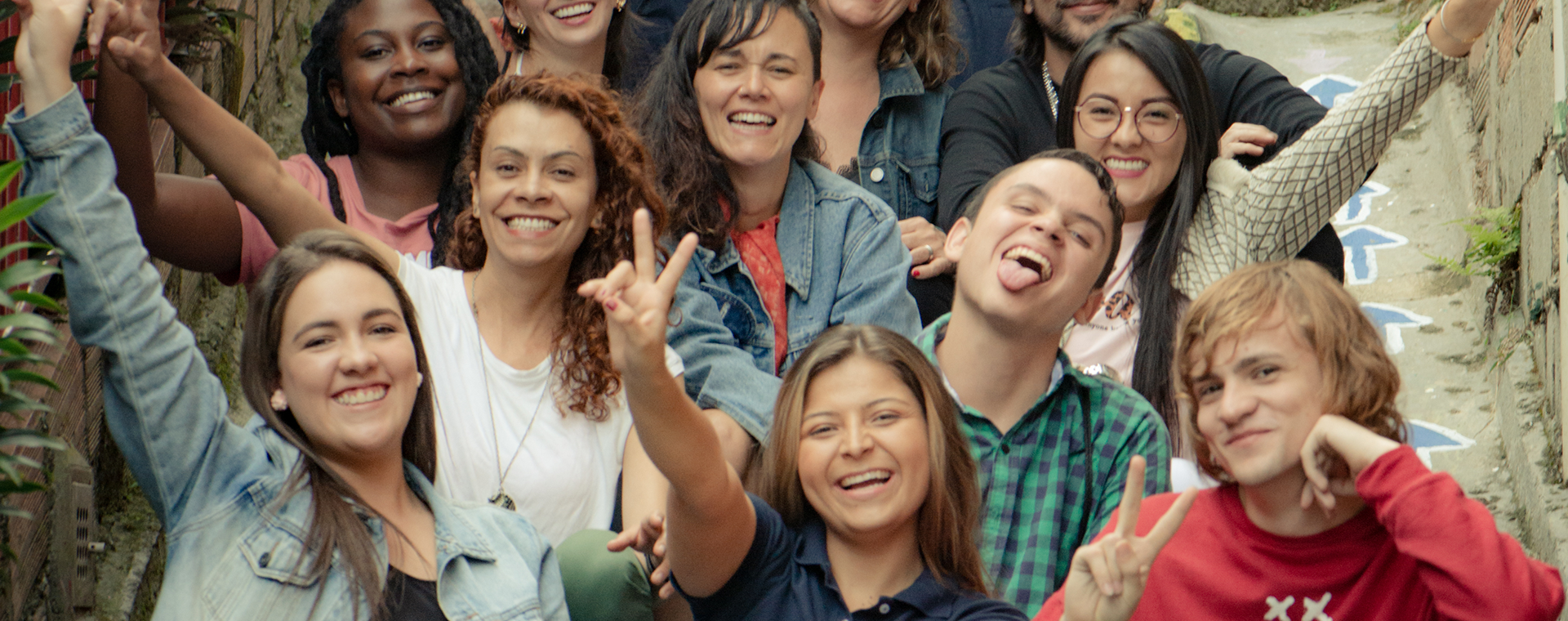
Step 3: Social Transformation
When a young leader connects with others, the echo of his voice is amplified, and the possibility of influencing decisions that affect society goes from an idea to reality. This is what we believe and demonstrate in Mi Sangre, and we do it through our mobilization and advocacy, a commitment that seeks to position critical issues on the public agenda and unite voices and actions based on common causes. We have done this, for example, with campaigns to prevent the forced recruitment of boys, girls, and young people at a time when entire generations enlisted the ranks of armed groups on the fringes of the law. “Dreaming is a right”, we said, and we carried this proclamation on different platforms, with alliances, and in the media.
When Colombia went through one of the most important moments in its history, the signing of a peace agreement with the oldest guerrilla force in Latin America, we led a campaign called “Art makes you part,” and we invited the country’s youth to respond creatively to the question: “How to start over, this time with everyone?” We wanted to build a new narrative and understand the peace process as a historical opportunity in which young people were, and are, protagonists.
Every September we also commemorate the International Day of Peace with the campaign “May peace touch you,” and recently, during election times, we mobilized around the slogan “Do not give it to just anyone.” This call was for a conscious and more informed vote. The latter campaign was an example of the power of networking, of how, when different actors in society come together and unite around the same purpose, powerful changes are achieved. 2018 was the year with the highest voter turnout in Colombia in the last 40 years. We encouraged young people to participate in political life, and the result was an expansive movement that started conversations and created spaces for electoral pedagogy. As a result of these actions, the State’s National Registrar launched data on young voters in the legislative and presidential elections for the first time in its history.
Step 4: Systemic change
In the last 13 years, we have impacted more than 1,300,000 people. For a Foundation, this is a significant figure. But for all the challenges facing Colombia, this number is very limited. How can experiences like that of Mi Sangre and that of other organizations that have achieved social innovation reach scale to interrupt violent cycles, and cultivate a culture of peace? We need more systemic interventions; learning ecosystems where all the actors who influence the next generation come together: from direct participants like families, teachers, community leaders, social organizations, to the media, and even governments responsible for public policy, companies that can give priority to young agents of change, and the entertainment industry – everyone who can contribute to changing the narrative around the role of young people as peacebuilders.
This will require determination and time – time to listen to each other, time to align, collaborate, and act systemically to encompass various dimensions of the system. And it will also require the determination to participate in the process with an open mind, hand, and heart, to dare to live a personal transformation and thereby achieve systemic transformation. As Krishnamurti states: “Systems, educational or political, do not change mysteriously. They transform when there is a fundamental transformation in ourselves. The individual is the most important, not the system. As long as the individual does not fully understand his inner process, no system, neither left nor right, will be able to bring order and peace to the world.”
Reimagine our way of approaching the world
To reimagine Colombia as a country where new generations lead the construction of a culture of peace, it is worth questioning the way we as leaders approach the world. In our experience, despite the adverse context in which we work, our perspective that things are possible has been fundamental to our success. We are inspired by the infinite potential of all human beings. We get the best out of each person and each situation. Where many see passive victims, we see the possibility of change, creativity, and resilience. Where many see deficiencies, we see human, social, and cultural capacities. We build on what exists. And this transforms mindsets and is an essential step to change realities.
Before changing the world, we change our world, because we know that the quality of social projects depends on the inner state of those who undertake them. That is why we encourage self-reflection experiences, mindfulness practices, and challenge ourselves to explore beyond our comfort zone to learn new ways of BEING and doing. We practice empathy: we see human beings – not accusations or stereotypes. We listen carefully to understand the other, and we put ourselves in their shoes, although sometimes we do not walk in them. We connect from a place of humanity, respect, and freedom.
And although it seems like a romantic and even ethereal manifesto, as a Foundation we are proud to declare that our work of more than a decade has been guided by love. Love is the opposite of fear, it is a creative energy that is contagious. Love is an attitude towards life that allows us to connect and weave ties in order to build a just society that listens to and loves itself, that understands the relationship of each being with everything, that is capable of awakening what is best in each individual. We strive towards a peaceful, democratic, and inclusive society, and we have embarked on this long road to peace.
The content of this article was translated and adapted from “Reimaginando a Colombia: Visiones del País que Podemos Construir“, published in 2019 by Editorial Planeta y and edited by McKinsey & Company.


